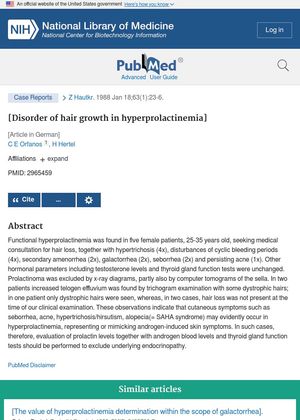Disorder of Hair Growth in Hyperprolactinemia
January 1988
in “
PubMed
”

TLDR High prolactin levels can cause skin and hair symptoms similar to those caused by hormone imbalances.
In 1988, a study was conducted on five female patients aged 25-35 years who were experiencing hair loss and other symptoms such as hypertrichosis, disturbances of cyclic bleeding periods, secondary amenorrhea, galactorrhea, seborrhea, and acne. These patients were found to have functional hyperprolactinemia, a condition characterized by elevated levels of the hormone prolactin. Other hormonal parameters, including testosterone levels and thyroid gland function tests, were unchanged. Prolactinoma, a type of noncancerous tumor of the pituitary gland, was ruled out through x-ray diagrams and computer tomograms. The study concluded that cutaneous symptoms such as seborrhea, acne, hypertrichosis/hirsutism, and alopecia (collectively known as SAHA syndrome) may occur in hyperprolactinemia, mimicking androgen-induced skin symptoms. Therefore, in such cases, evaluation of prolactin levels along with androgen blood levels and thyroid gland function tests should be performed to exclude underlying endocrinopathy.




